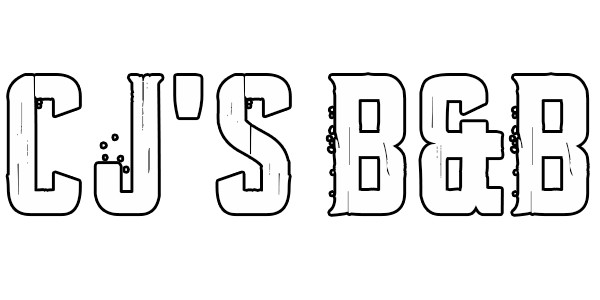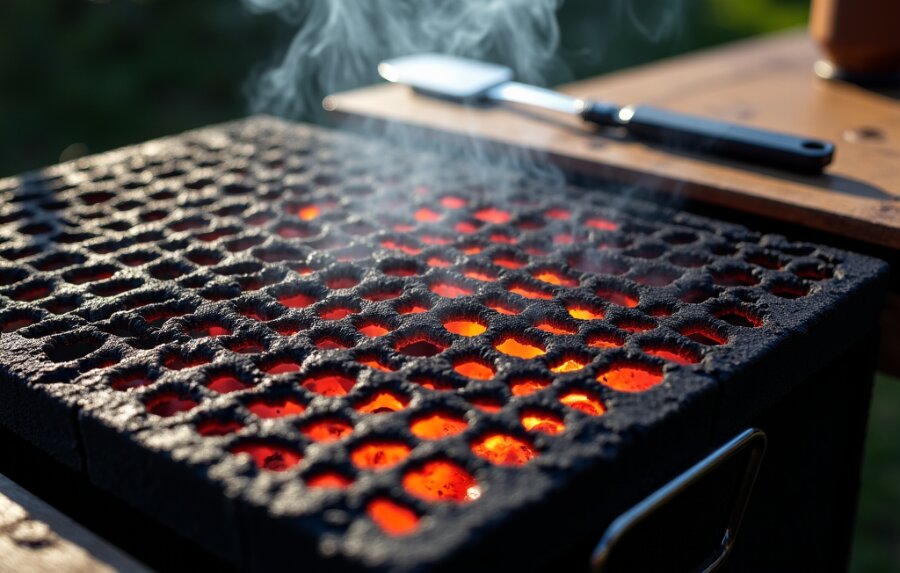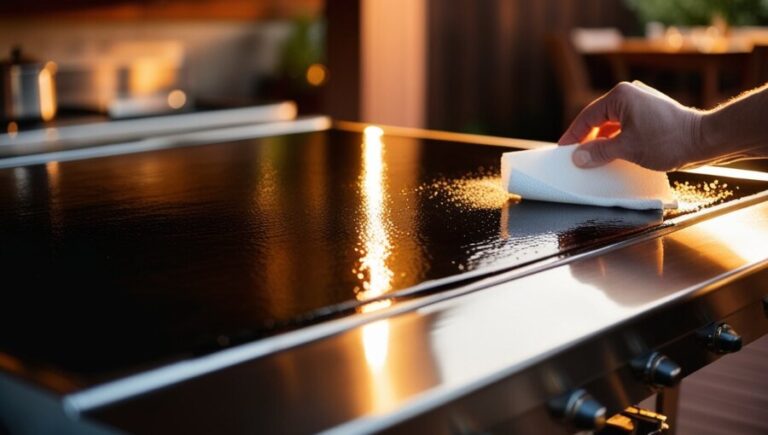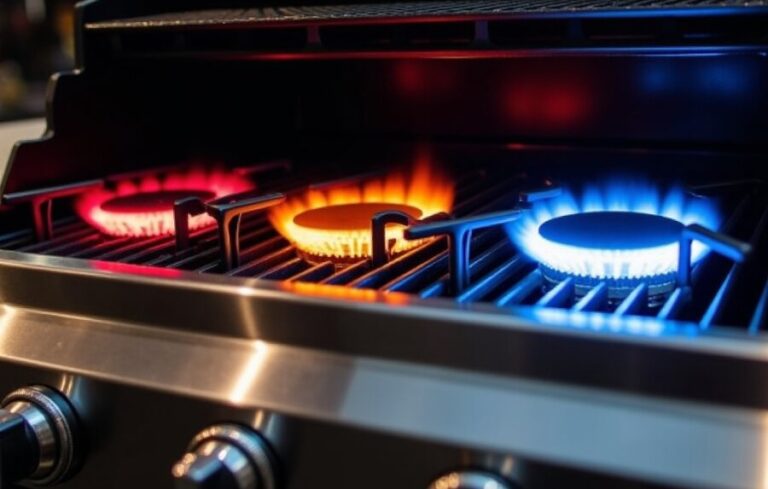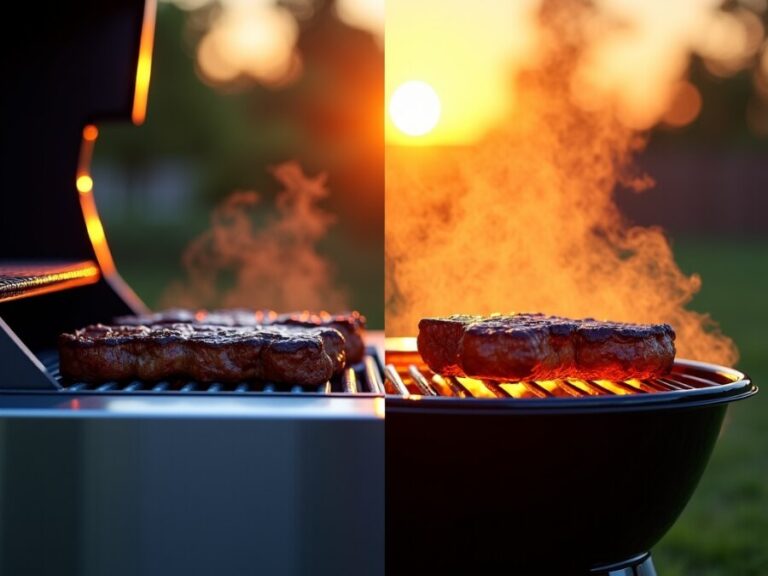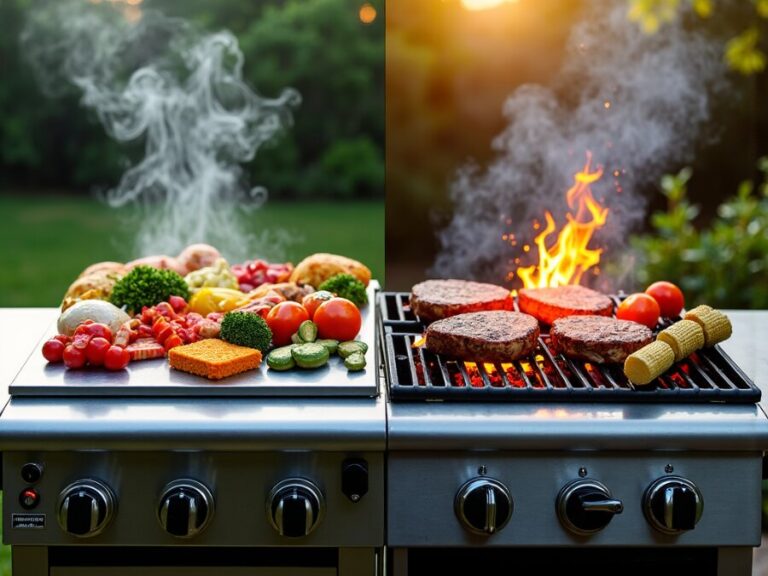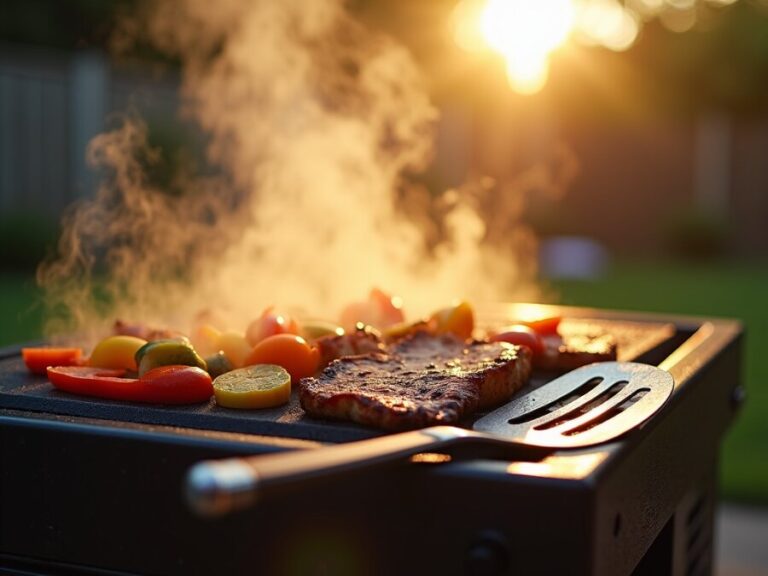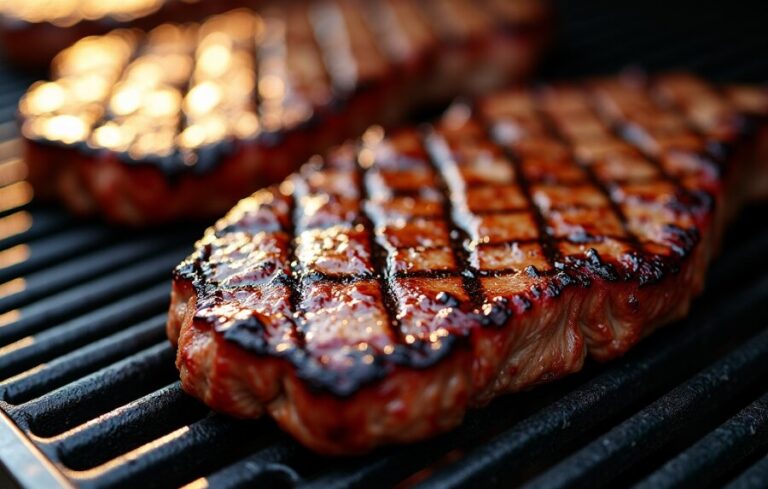Our evaluations and product assessments are conducted using a thorough and unbiased approach. Should you choose to buy any items through our provided links, we might receive a commission Read our disclosures.
The Magic of Charcoal Grills
One of the best charcoal grill advantages is the unique, smoky flavors and creativity I can infuse into my cooking. Charcoal grills have some clear perks that make the grilling experience top-notch.
Superior Flavor Infusion
When I light up the charcoal grill, the flavors speak for themselves. There’s a smokiness that gas just can’t replicate. Every time juice drips onto those hot coals, steam rises, enhancing everything I’m cooking.
And let’s not forget the magic it works on budget-friendly cuts of beef, like flap meat. These cuts soak up marinades and char beautifully, leading to succulent, juicy kabobs. The sear from charcoal locks in those tasty juices, making every bite a delight.
Flavor Comparison Table
| Grilling Method | Flavor Profile |
|---|---|
| Charcoal | Smoky and well-rounded |
| Gas | Clean but less complex |
| Wood | Intensely smoky and rich |
Culinary Creativity Unleashed
A charcoal grill is like a playground for food lovers. Its versatility lets me experiment with different techniques and flavors. One of my go-to appetizers is corn husk-grilled goat cheese with corn relish and honey. The blend of zesty and smoky is perfect for summer nights.
And don’t even get me started on desserts. Grilled s’mores pie or skillet brownies take on a unique smokiness that makes these classics even more irresistible.
In summary, a charcoal grill does more than just cook. It transforms ordinary meals into unforgettable experiences, impressing family and friends alike. Curious about how charcoal stacks up against gas? Check out our comparison of gas vs charcoal grills.
Ready to up your grilling game? Grab some charcoal and let’s get cooking!
Why Charcoal Grilling Rocks
Grilling is one of those activities that gets me excited to be outdoors, especially when I get my charcoal grill going. There are clear perks to using a charcoal grill that boost not only the flavor but also the health benefits of your food.
Searing Like a Pro
Charcoal grills can work magic on your meats, giving them that perfect sear. The heat is intense and sustained, so you don’t have to keep adding fuel. The taste you get from charcoal is richer than gas and more nuanced than wood. When the meat juices hit those hot coals, steamy, smokey goodness goes right back into your food. You get a fantastic crust on the meat’s surface, creating an irresistible char that’s hard not to love. Curious about the differences between grill types? Check out our gas vs charcoal grills article.
| Grill Type | Ideal Cooking Temperature (°F) | Best for Searing |
|---|---|---|
| Charcoal | 400 – 700 | Absolutely |
| Gas | 300 – 500 | Decent but not great |
Better Nutrition
Grilling, especially at higher temps, can actually make your meals healthier. Cooking like this lets more vitamins and minerals seep into your food compared to boiling or baking. Plus, grilling needs no extra fats, making it a healthier option that won’t sneak in extra calories (NYHealth).
Grilled foods get a crispy exterior and stay juicy inside because they’re cooked directly over the heat. High temps also let the fat drip away, cutting down on calories and maybe even helping with weight loss. This way, you get succulent meats that keep more of their nutrients compared to other methods.
| Nutritional Benefit | Charcoal Grilling | Other Methods |
|---|---|---|
| Preserves Vitamins & Minerals | High | So-so |
| Boosts Flavor | Definitely | Not really |
| Needs No Extra Fat | Yes | Nope |
If you’re looking to step up your grilling game, especially with a gas grill, check out our gas grill cooking tips. Whether you’re a newbie or a BBQ veteran, charcoal grilling can seriously up your game.
Which Grill Saves You Money?
Let’s talk grills. If you’re like me, you want a good cookout without burning a hole in your wallet. I’ve broken down the costs of different types of grills to help you figure out the best bang for your buck.
What You’re Paying For
Getting a grill isn’t just about the upfront cost (though that’s a biggie). You’ve got to think about the ongoing expenses too—like fuel. Here’s a quick look at what you’ll spend on different grills for an hour of cooking at 225 degrees:
| Grill Type | Cost per Hour | Initial Investment |
|---|---|---|
| Charcoal Grill | $2.85 | Average |
| Gas Grill (Propane) | $1.20 + flavoring | Average to High |
| Electric Grill | $0.26 | Low |
| Pellet Grill | $0.76 | Average to High |
Electric grills are cheaper to run but let’s be honest—the flavor, well, can leave you wanting more. Charcoal and gas grills? They bring the taste but add to your fuel bill.
What’s Fueling Your Grill?
Drilling into fuel costs helps you see the full picture. Here’s what you’re looking at for an hour of grilling:
Charcoal Grills: You’re looking at around $2.85 per hour. Charcoal needs time to heat up and you need to watch it like a hawk. It’s perfect for those who don’t mind a bit of labor for that smoky flavor (Cookinpellets).
Gas Grills (Propane): This will set you back about $1.20 per hour. If you toss in soaked wood chips for extra flavor, your costs rise a bit. But the convenience is hard to beat (Cookinpellets).
Electric Grills: Literally pennies at $0.26 per hour. Cheapest option, hands down. But flavor-wise, you might feel a bit shortchanged. Add wood flavoring, and you’re looking at $1.50 per session.
Pellet Grills: About $0.76 per hour. For those who want good flavor without the mess of charcoal or the high costs of propane (Cookinpellets).
It pays to look at both the starting cost and the ongoing fuel expenses to grasp the real savings here. Curious how gas and charcoal grills measure up? I’ve got the details covered here.
Enjoy your grilling and save some bucks while you’re at it!

Picking the Perfect Grill
Choosing the right grill isn’t just about how it cooks; it’s about reflecting your personal taste and style. Think of it as adding a piece to your culinary wardrobe. Are you a flavor chaser or a cooking adventurer? Let’s break it down.
Flavor Battle
When it comes to flavor, it’s charcoal vs. gas. Charcoal grills pump out a deep, smoky taste that makes your food unforgettable. It’s like adding a natural seasoning. Perfect for when you want your barbecue to be the star of the show. Propane grills, on the other hand, bring even heat. It’s reliable and convenient but doesn’t pack the same flavor punch as charcoal (Chicago Steak Company).
For me, the smoky magic of charcoal wins. It transforms meats and veggies into something special. Here’s a quick taste test cheat sheet:
| Grill Type | Flavor |
|---|---|
| Charcoal | Smoky, bold |
| Gas | Mild, consistent |
If you’re a flavor fanatic, charcoal is your best buddy.
Cooking Style
Your cooking style should steer your choice. If you’re all about quick, hassle-free meals, gas grills are your go-to. They heat up fast and offer precise control. Ideal for busy nights or impromptu cookouts. You turn the knob, and you’re ready to go.
But if you’re the type who loves the process, charcoal grills are your playground. Lighting the coals, waiting for them to heat up, adjusting vents—it’s an experience. Perfect for low and slow cooking. Plus, who doesn’t love the ritual of it all?
Here’s a rundown based on what you love:
| Cooking Style | Ideal Grill |
|---|---|
| Quick and easy | Gas |
| Slow and experimental | Charcoal |
Ultimately, the best grill for you hinges on what you enjoy most about cooking. Both options have their perks. By thinking about your flavor cravings and cooking habits, you’ll find your perfect match. For more grilling insights, check out my piece on gas vs. charcoal grills.
Why Grilling Rocks for Your Health
Grilling isn’t just about chowing down on tasty, smoky-flavored food outdoors. It’s also packed with health perks that make your barbecue moments even better. I’ll dive into how grilling cuts calories and keeps those precious nutrients intact.
Cutting Calories Like a Pro
One awesome thing about grilling is that it helps keep calories in check. When you grill, the excess fat drips right off the food, leaving you with a leaner, juicier meal. It’s like magic, really. Research says grilling can help you eat fewer calories and less fat, all while keeping your meal satisfying. This can help you manage your weight, lower cholesterol, and keep you feeling full longer due to all those tasty flavor compounds created during the grilling process (NYHealth).
| Grilling Method | Calories Saved |
|---|---|
| Grilling vs. Pan-frying | 20-40% less fat |
| Grilling vs. Baking | 10-30% less fat |
Keeping Nutrients on Lock
Grilling is a champ when it comes to preserving those all-important vitamins and minerals. The high heat from grilling means more nutrients stay in your food, unlike boiling which can wash them away (NYHealth). Plus, since grilling generally skips the added fats and oils, it’s a great way to eat healthily without extra calories.
Vitamins like B and minerals are better retained when grilling compared to other cooking methods, making your meal not just tastier but healthier too.
| Nutritional Aspect | Grilled | Boiled/Baked |
|---|---|---|
| Vitamin Retention (%) | 80-90% | 60-70% |
| Mineral Retention (%) | 75-85% | 50-60% |
Wrapping It Up
Grilling doesn’t just make your food tastier; it’s a sweet combo of flavor and health. With benefits like calorie cutting and nutrient retention, you’re getting the best of both worlds. Curious about standing the best grilling? Check out more on gas vs charcoal grills for your next backyard feast.
Grilling Showdown: Charcoal vs. Gas
Alright, BBQ lovers, let’s get real about the eternal debate: charcoal or gas? Both have strong points, but for me, charcoal is king. Let’s break down what makes these two different and which one might be your backyard hero.
Charcoal vs. Gas: The Basics
First off, cooking temperature. Charcoal grills ramp up to about 700°F, making them hotter than most gas grills, which top out around 500°F. That extra 200 degrees is like bringing a bazooka to a knife fight when it comes to searing steaks.
Yes, charcoal grills take a bit more time to heat up, but the payoff? Totally worth it. The smoky flavor that seeps into your food is pure magic and hard to beat. Gas grills, on the other hand, win hands down in the convenience department. They heat up fast and maintain an even temperature, so if you’re in a hurry, they’re the way to go.
Here’s a quick comparison to see how they stack up:
| Feature | Charcoal Grills | Gas Grills |
|---|---|---|
| Max Temp | Up to 700°F | Up to 500°F |
| Flavor | Smoky, rich | Clean, not as intense |
| Time to Heat | Takes longer | Heats up quickly |
| Fuel Cost | Around $2.85 per cook | Generally pricier |
| Temp Control | Less precise | Very precise |
| Maintenance | More clean-up | Easier maintenance |
Charcoal Magic: The Guaiacol Factor
What makes charcoal grilling so special? Meet guaiacol, a fancy-sounding compound that gets created when you burn wood or charcoal. It’s the secret ingredient giving your food that mouth-watering, smoky, bacon-like taste that gas grills can’t touch. If you want that genuine BBQ essence, guaiacol is your new best friend.
Charcoal’s super intense heat is perfect for those beautiful sear marks and that crispy, caramelized crust. It’s a game-changer. If you’re after bold, smoky flavors that make your taste buds stand and cheer, charcoal is your go-to.
Real Talk: Which to Choose?
So, which grill should you choose? If you’re all about that rich, smoky flavor and don’t mind a bit of extra prep time, charcoal is a no-brainer. If convenience and control are more your style, then a gas grill will make your life easier.
Personal Note
I’ve been grilling for years, and there’s something deeply satisfying about getting that charcoal lit, waiting for the perfect moment, and then tasting that unmistakable flavor. But hey, I also love the quick and clean cookouts on my gas grill when I’ve got a crowd to feed fast. Either way, grilling is a win-win.
Check out our guides on gas vs charcoal grills and gas grill cooking tips for more grilling wisdom. Happy BBQing!

